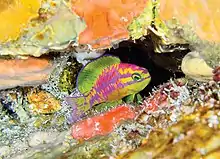Tosanoides aphrodite
Tosanoides aphrodite, the Aphrodite anthias,[1] is a species of marine ray-finned fish, from the subfamily Anthiinae part of the family Serranidae, the groupers and sea basses. It was discovered in the Atlantic Ocean in 2018, the only one in its genus to be discovered there.[2] It was first identified by Luiz A. Rocha and Hudson Pinheiro, staff members of the California Academy of Sciences.[3] The fish is electric pink and yellow and has bright green fins.[4] It was discovered near Brazil and can be distinguished by 15-16 soft dorsal fin rays and 9 anal fin rays.[5] They are sexually dichromatic, meaning the males and females are different colors. It is named after Aphrodite, the Greek goddess of love and beauty. This species was found on mesophotic coral ecosystems of the Saint Paul's Rocks. They like to live in small spaces in rocky reefs. Also, they tend to live in areas between 13 and 15 degrees Celsius. Along with differences in body proportions, morphology of rays, distribution separates this genus from others that have previously existed.
| Tosanoides aphrodite | |
|---|---|
 | |
| Scientific classification | |
| Kingdom: | Animalia |
| Phylum: | Chordata |
| Class: | Actinopterygii |
| Order: | Perciformes |
| Family: | Serranidae |
| Genus: | Tosanoides |
| Species: | T. aphrodite |
| Binomial name | |
| Tosanoides aphrodite | |
References
- Froese, Rainer and Pauly, Daniel, eds. (2019). "Tosanoides aphrodite" in FishBase. December 2019 version.
- "New, Ultra-Colorful Neon Fish Species Discovered". 2018-09-25. Retrieved 2018-10-16.
- GrrlScientist. "This New Fish Species Looks Like It Was Colored With Highlighter Pens". Forbes. Retrieved 2018-10-16.
- Thompson, Helen (2018-09-25). "This new fish species displays a splash of highlighter hues". Science News. Retrieved 2018-10-16.
- Pinheiro, Hudson T.; Rocha, Claudia; Rocha, Luiz A. (2018-09-25). "Tosanoides aphrodite, a new species from mesophotic coral ecosystems of St. Paul's Rocks, Mid Atlantic Ridge (Perciformes, Serranidae, Anthiadinae)". ZooKeys (786): 105–115. doi:10.3897/zookeys.786.27382. ISSN 1313-2970. PMC 6168617. PMID 30283238.